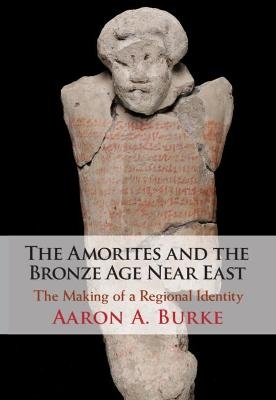
The Amorites and the Bronze Age Near East
The Making of a Regional Identity
Seiten
2020
Cambridge University Press (Verlag)
978-1-108-49596-7 (ISBN)
Cambridge University Press (Verlag)
978-1-108-49596-7 (ISBN)
This study summons historical, archaeological, and iconographic data from Bronze Age Mesopotamia, the Levant, and Egypt to address the legacy of Amorites.
In this book, Aaron A. Burke explores the evolution of Amorite identity in the Near East from ca. 2500–1500 BC. He sets the emergence of a collective identity for the Amorites, one of the most famous groups in Ancient Near Eastern history, against the backdrop of both Akkadian imperial intervention and declining environmental conditions during this period. Tracing the migration of Amorite refugees from agropastoral communities into nearby regions, he shows how mercenarism in both Mesopotamia and Egypt played a central role in the acquisition of economic and political power between 2100 and 1900 BC. Burke also examines how the establishment of Amorite kingdoms throughout the Near East relied on traditional means of legitimation, and how trade, warfare, and the exchange of personnel contributed to the establishment of an Amorite koiné. Offering a fresh approach to identity at different levels of social hierarchy over time and space, this volume contributes to broader questions related to identity for other ancient societies.
In this book, Aaron A. Burke explores the evolution of Amorite identity in the Near East from ca. 2500–1500 BC. He sets the emergence of a collective identity for the Amorites, one of the most famous groups in Ancient Near Eastern history, against the backdrop of both Akkadian imperial intervention and declining environmental conditions during this period. Tracing the migration of Amorite refugees from agropastoral communities into nearby regions, he shows how mercenarism in both Mesopotamia and Egypt played a central role in the acquisition of economic and political power between 2100 and 1900 BC. Burke also examines how the establishment of Amorite kingdoms throughout the Near East relied on traditional means of legitimation, and how trade, warfare, and the exchange of personnel contributed to the establishment of an Amorite koiné. Offering a fresh approach to identity at different levels of social hierarchy over time and space, this volume contributes to broader questions related to identity for other ancient societies.
Aaron A. Burke is professor of Near Eastern archaeology and the Kershaw Chair in the Archaeology of the Ancient Eastern Mediterranean at the University of California, Los Angeles. He has written on warfare, culture and social change in the Bronze and Iron Ages.
1. Introduction: Amorites, their legacy, and the study of identity; 2. Communities at the margins: the origins of Amorite identity, 2500–2200 B.C.; 3. Beyond pastoralism: diaspora and opportunity, 2200–2000 B.C.; 4. Mercenaries and merchants: networks of political and economic power, 2000–1800 B.C.; 5. Competition and emulation: the Amorite Koiné from Dilmun to Avaris, 1800–1500 B.C. 6. Conclusion: Amorite identity in the long durée.
| Erscheinungsdatum | 15.01.2021 |
|---|---|
| Zusatzinfo | Worked examples or Exercises |
| Verlagsort | Cambridge |
| Sprache | englisch |
| Maße | 183 x 259 mm |
| Gewicht | 1050 g |
| Themenwelt | Geschichte ► Allgemeine Geschichte ► Vor- und Frühgeschichte |
| Geisteswissenschaften ► Geschichte ► Regional- / Ländergeschichte | |
| ISBN-10 | 1-108-49596-6 / 1108495966 |
| ISBN-13 | 978-1-108-49596-7 / 9781108495967 |
| Zustand | Neuware |
| Informationen gemäß Produktsicherheitsverordnung (GPSR) | |
| Haben Sie eine Frage zum Produkt? |
Mehr entdecken
aus dem Bereich
aus dem Bereich
Was Pompeji über uns erzählt
Buch | Hardcover (2023)
Propyläen (Verlag)
CHF 44,75
auf den Spuren der frühen Zivilisationen
Buch | Hardcover (2023)
C.H.Beck (Verlag)
CHF 27,95


